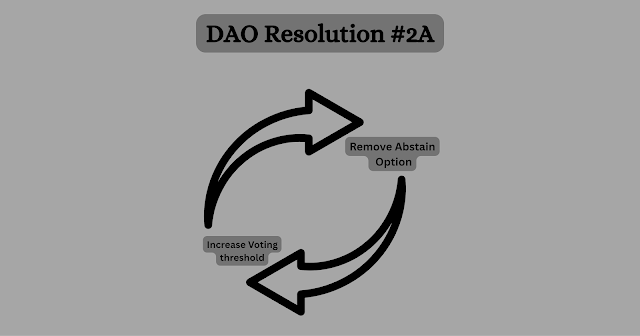The DAO is evolving, and DAO Resolution #2 aims to enhance its proposal process by focusing on two key areas: voting thresholds and Work Group $JUP allocations. These changes, proposed for community feedback, seek to strengthen the DAO’s legitimacy, accountability, and alignment with its mission to accelerate Jupiter’s growth. Below is a concise overview of the proposed resolutions.
Key Points of DAO Resolution #2
Resolution 2A: Voting Thresholds and “Abstain”
Increase Voting Threshold: Raise the passing threshold for DAO votes from a simple majority to a 65% supermajority to ensure broader community support and stronger social mandates.
Remove Abstain Option: Eliminate “Abstain” as a voting option, as it dilutes voter sentiment and undermines Active Staking Rewards, which incentivize clear opinions. Abstain votes (10-15% currently) effectively act as “No” votes, complicating supermajority requirements.
Benefits: Encourages coalition-building, reflects clearer community sentiment, and enhances DAO credibility.
Resolution 2B: Work Group $JUP Allocations
One-Year Terms: Limit Work Group (WG) proposals to one-year terms, requiring renewal for subsequent years, replacing multi-year $JUP allocations.
Retroactive $JUP Allocation: Remove $JUP from initial WG budgets; instead, allocate $JUP retroactively at the end of the term based on performance.
Formalized Measures of Success: Require WGs to include 1-5 qualitative and quantitative metrics in proposals to evaluate their impact on the DAO’s mission.
Performance Evaluation Vote: Conduct a formal vote at the end of each WG’s term to determine $JUP bonuses based on performance against stated metrics.
Proposed $JUP Bonus Tiers (per full-time member, based on WG size at proposal):
- Tier 1 (Below Expectations): 25,000 $JUP
- Tier 2 (As Expected): 75,000 $JUP
- Tier 3 (Above Expectations): 100,000 $
Tier 4 (Critical for DAO Success): 150,000 $JUP
Benefits:
Reduces FUD around $JUP allocations, easing the proposal process.
Enhances accountability by tying rewards to performance.
Attracts talent by providing predictable, merit-based rewards.
Note: These changes apply only to future WGs, not previously approved ones.



